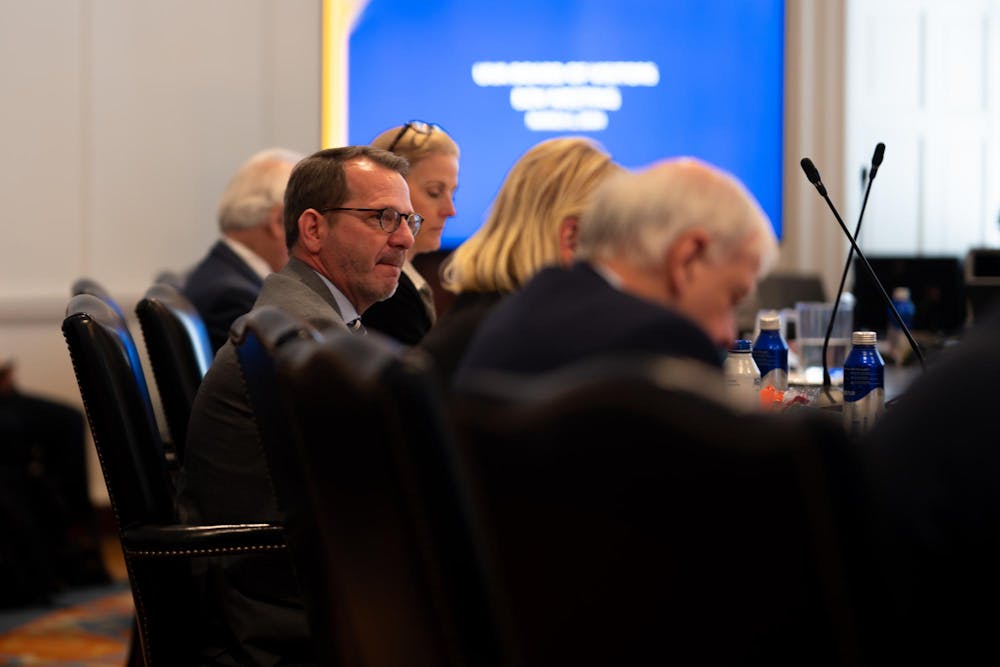The Board of Visitors Finance Committee voted to approve a new motion to require Board approval on all Strategic Investment Fund grants — which provide funding for 2030 Plan projects and initiatives — at their Friday meeting. The Committee also voted to increase dining and on-Grounds housing rates, as well as tuition for some of the University’s masters and graduate-level programs.
The SIF was established by the Board in 2016 as a pool of funding for strategic investments to support initiatives part of the University’s 2030 Plan. The meeting agenda included an action item to approve SIF guideline revisions and a $195 million allocation for awards of up to $65 million a year for three fiscal years, which the Committee ultimately did not vote on.
Currently, the SIF is overseen by the SIF Oversight Committee, which includes Ian Baucom, executive vice president and provost, Jennifer “J.J” Wagner Davis, executive vice president and chief operating officer, Craig Kent, executive vice president for health affairs and Vice President for Research Lori McMahon.
During a discussion on this revision of SIF guidelines, Board member Doug Wetmore said he thinks the Board should ultimately approve all projects that use SIF spending, stating that reviewing proposals that ask for the University to spend large amounts of money on a project is an important responsibility of the Board. He motioned to add a Board review and approval step to the existing SIF project process, which currently allows University administration to invest the SIF money with regards to the strategic plan, instead of passing the planned agenda item.
“I think that an essential role for the Board of Visitors is to monitor, review and approve money that’s being spent on behalf of the University,” Wetmore said. “My hope would be that we could even help with ideas and consultation and collaboration that would make the program even more successful than it already is.”
Over the last eight years, there have been 78 total awards made from the SIF funding according to Davis. L.F. Payne, Board member and chairman of the Board’s Advancement Committee. He said that the change could add impediments to the system that could make it more challenging for the Committee to do their work.
“If it ain’t broke, don’t fix it,” Payne said.
Ryan said he appreciates the desire for the Board to have more input on the funding and that he is not opposed to it. However, Ryan asked for an exception to this approval specifically in relation to using SIF funds to match scholarships, professorships and large philanthropic gifts up to $65 million for the rest of the Honor the Future campaign. The Committee voted to pass Wetmore’s motion, as well as to approve the request made by Ryan, instead of the original agenda item for the new guidelines.
The Committee also approved Major Capital Project financial plans during the meeting, including the construction authorization for the Ivy Corridor Student Housing project, as well as the funding amount for the North Grounds parking garage, which was approved in June 2022.
The Ivy Corridor Student Housing project is a planned three-building apartment style facility with approximately 800 beds. It is estimated to cost between $150 million and $160 million.
The North Grounds parking garage will cost an estimated total of $50 million, which will be funded by taking on $24.6 million of debt, $7.2 million from Parking and Transportation’s cash reserves and $18.2 million in institutional funds. Davis said the primary use of the parking garage will be for commuters, employees and parking for athletic events, with potential student reserve spaces.
Faculty Representative Michael Kennedy said parking is the number one issue for faculty due to parking locations often being far and expensive, so he said he hopes the University can find creative options for paying for the garage without using parking fees for employees.
The Committee also discussed the University’s contract rates for student dining services during the meeting, with the committee voting to approve an average meal plan rate increase of 5.5 percent. Davis said the rates reflect labor costs, food inflation costs and the dietary needs of the student body.
The University is engaged in a 20 year long contract with Aramark food service provider for their dining facilities, which it is roughly halfway through. There are roughly 9,000 students who purchase dining contracts according to Davis.
Ryan asked Davis how the University ensures Aramark has incentives to provide the best quality at a fair price — an issue he said long contacts often present. Davis said Aramark has been a good partner but that a working group of students and faculty staff who give feedback on the dining services have reported uneven quality. Last year, this uneven quality led the University to hire an independent third party to evaluate the relationship.
“Last year, the quality [was] uneven,” Davis said. “We have a student working group … working on systematic improvements in some areas, and then also maintaining quality where quality is really high.”
The Committee also voted to approve increases to the student and faculty and staff housing rates for 2025-26 academic year. The cost of the average double room rate for University students was increased by $433, rising from $7,895 this year to $8,328 next year, with an average undergraduate increase of 5.5 percent.
They also voted to approve increased tuition rates for graduate, professional and special programs for 2025-26. One of the largest increases was the Law School’s JD program which increased for in-state students by 4.3 percent from $74,700 to $77,900, and for out-of-state students by 4.1 percent, rising from $77,700 to $80,900. Davis said when considering rates, most programs are focused on compensation of their staff.
“We think that's incredibly important to recruit and retain talent, but it is a primary cost driver,” Davis said.
The Committee will reconvene at the Board’s next meeting in March.







